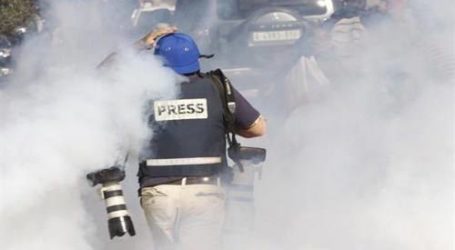ISRAEL OCCUPATION AUTHORITY MOVES AFRICAN PRISONERS TO NEGEV DESERT
 Tel Aviv, 10 Safar 1435 / 13 December 2013 ( MINA ) – A Spokeswoman for Israeli occupation prison services, Sivan Weitzman said on Thursday that around 500 African migrant prisoners were moved to Negev Desert as a new Israeli jail.
Tel Aviv, 10 Safar 1435 / 13 December 2013 ( MINA ) – A Spokeswoman for Israeli occupation prison services, Sivan Weitzman said on Thursday that around 500 African migrant prisoners were moved to Negev Desert as a new Israeli jail.
She added that the number would increase to 1,000 by the end of December.
On Monday, the Israeli parliament, Knesset, approved a law allowing officials to keep African migrant workers in detention facilities without trial for one year. Press TV reported as quoted by Mi’raj Islamic News Agency (MINA).
The law also gives Israel the right to send immigrants to complexes called “open facilities” — until they are deported or voluntarily go back to their homelands. Migrants kept in the open facilities will have no right to work.
Critics of the new law have described the open facilities as prisons, predicting the new law will be challenged in the Supreme Court.
More than 50,000 African immigrants, mostly from Sudan and Eritrea, currently work in low-paying jobs in Israel.
Orit Marom, a migrant advocate, said that Tel Aviv is using the pressure tactic to make migrants leave Israel voluntarily.
Human Right Watch has said that Tel Aviv used the “threat of prolonged detention” to force the African migrants give up their asylum claims, adding, “Israel should end its unlawful detention policy and release all asylum seekers.”
Israel occupation authority constructed a vast detention facility in the Negev desert to house the thousands of immigrants that cross illegally into Israel from Egypt every year.
Human rights groups fear that the detention centre, the largest of its kind in the world, with a capacity to hold 8,000 migrants, will turn into a festering refugee camp, and deprive those escaping persecution at home of their rights to seek asylum in Israel.
The project was approved by Israel’s right-wing government 18 months ago, but many Israelis are uncomfortable about spurning asylum seekers from war-torn African countries given their own history as a nation of refugees.
“We’ll do all it takes to provide reasonably humane conditions,” an unnamed defence official told. “We all wish we didn’t have to build such a facility. But we’re in a certain situation due to certain circumstances, and we need a facility to address these needs.”
The facility, which will be built on the grounds of Ketziot prison near Israel’s southern border, will accommodate migrants, including women and children, for up to three years before they are deported to their country of origin; those from “enemy” states, such as Sudan, who cannot be repatriated, could be detained indefinitely.
The centre, which will include medical, community and sports facilities, is intended to tackle an immigration problem that politicians say threatens to overwhelm Israel’s population of 7.5 million. Speaking 18 months ago, the Prime Minister, Benjamin Netanyahu, said it was time “to stop this growing influx that threatens Israelis’ jobs and changes the character of the state”.
Every year, thousands of Africans, mostly from Sudan and Eritrea, begin the arduous journey to Israel via the arid Sinai Peninsula, a lawless territory where Bedouin traffickers extract huge fees to smuggle refugees past Egyptian border patrols.
Israel occupation Interior Ministry estimates that 17,000 people crossed the Israel-Egypt border last year, many more than in previous years. They may have been spurred by Israel’s decision to build a sturdy border fence backed up with electronic surveillance equipment.
Reut Michaeli, director of the Hotline for Migrant Workers, said that building a detention centre would do little to deter those in genuine need. “People fleeing for their lives… will not stop coming because they face three years in detention,” she said.
Israel occupation claims that most asylum seekers are economic migrants, a view reflected in the number that gain refugee status each year – less than 1 per cent of the total.
But human rights groups say that most of the Sudanese and Eritrean migrants are escaping persecution at home, citing worldwide figures from last year that claim 84 per cent of Eritreans seeking asylum, and around 60 per cent of Sudanese migrants, were eligible for refugee status.
At present, Israel occupation has a policy of not deporting migrants back to Eritrea and Sudan because of the unstable situation there. However, it does not recognise them as refugees. (T/P04/E1)
Mi’raj News Agency (MINA)





